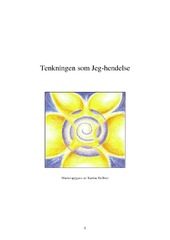| dc.contributor.author | Skilbrei, Karina | eng |
| dc.date.accessioned | 2011-03-23T06:57:04Z | |
| dc.date.available | 2011-03-23T06:57:04Z | |
| dc.date.issued | 2008-11-19 | eng |
| dc.date.submitted | 2008-11-19 | eng |
| dc.identifier.uri | https://hdl.handle.net/1956/4599 | |
| dc.description.abstract | Oppgaven er et forsøk på å forene diskusjonen omkring tenkningens natur og virkemåte i verden og undersøkelsen av jegets ontologi. Tradisjonelt har disse blitt behandlet som to separate undersøkelser. Gjennom en belysning av tre ulike tankeimpulser/retninger; empirisme, fenomenologi og språkfilosofi (Wittgenstein) forsøker jeg å vise hvor nær forbindelse det er mellom de to undersøkelsene. Dette viser seg blant annet ved at det perspektivet man opererer med i forhold til det ene spørsmål, legger sterke føringer for hvordan man betrakter det andre. Tanken om et essensielt og transcendentalt jeg i mennesket, gir ofte store erkjennelsesteoretiske problemer. Dersom man tenker seg at vår bevissthet er konstituert av et enhetlig jeg, får vi umiddelbart problemer med å forklare hvordan dette er relatert til en ytre verden og til andre mennesker. Et slikt syn fører oss fort til en form for dualisme, og derfra er det tilsynelatende ikke lang vei til solipsismen. Etter mitt syn, trenger ikke dette å være tilfellet. Når vi oppdager hvordan jeget er relatert til verden gjennom tenkningen, ser problemet ut til å minske betraktelig. Oppgaven er således på den ene siden et forsvar for ikke-reduksjonisme med hensyn på jegets metafysiske status. På den andre siden er den et forsøk på reorientering i forhold til synet på tenkningsaktiviteten og dermed på erkjennelsens muligheter. | en_US |
| dc.description.abstract | The thesis is an attempt to conjoin the theory of knowledge and the discussion of the Self. Traditionally these two philosophical areas are treated as two separate investigations - on the one hand one investigates the possibilities of a pure, proper and true knowledge of the external world, and on the other hand one discusses the existence of some sort of a nucleas in the human being, which is usually called "a Self", and which expresses itself through the pronoun "I". This thesis suggests an alternative approach to both investigations. Through the account of three different perspectives; empirical, phenomenological and linguistic (Wittgenstein), which gives three different approaches to the two philosophical fields, I try to show how closely the investigations are linked together. The conception of a unitary and transcendent Self usually generates great difficulties in epistemology. If one thinks that the stream of consciousness is united in an unitary Self, it gets difficult to give a proper explanation of how the Self is genuinely connected to the world and to other human beings. A theory of the Self quickly turns into a dualistic view, which seems to lead us directly to solipsism. In my opinion, this does not have to be so. I choose to focus on what advantages the concept of a unitary ad transcendental Self can generate in the theory of knowledge. If we discover how closely the Self is connected to the world through the act of thinking, the problem seems to decrease. | en_US |
| dc.format.extent | 633119 bytes | eng |
| dc.format.mimetype | application/pdf | eng |
| dc.language.iso | nob | eng |
| dc.publisher | The University of Bergen | eng |
| dc.title | Tenkningen som Jeg-hendelse | eng |
| dc.type | Master thesis | en_US |
| dc.rights.holder | The author | en_US |
| dc.rights.holder | Copyright the author. All rights reserved | en_US |
| dc.description.degree | Master i Filosofi | |
| dc.description.localcode | FILO350 | |
| dc.description.localcode | MAHF-FILO | |
| dc.subject.nus | 713505 | eng |
| dc.subject.nsi | VDP::Humanities: 000::Philosophical disciplines: 160::Philosophy: 161 | eng |
| fs.subjectcode | FILO350 | |
